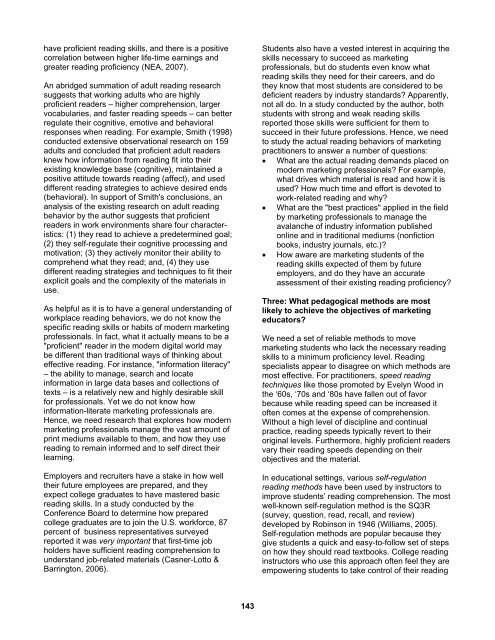2008 - Marketing Educators' Association
2008 - Marketing Educators' Association
2008 - Marketing Educators' Association
Create successful ePaper yourself
Turn your PDF publications into a flip-book with our unique Google optimized e-Paper software.
have proficient reading skills, and there is a positive<br />
correlation between higher life-time earnings and<br />
greater reading proficiency (NEA, 2007).<br />
An abridged summation of adult reading research<br />
suggests that working adults who are highly<br />
proficient readers – higher comprehension, larger<br />
vocabularies, and faster reading speeds – can better<br />
regulate their cognitive, emotive and behavioral<br />
responses when reading. For example, Smith (1998)<br />
conducted extensive observational research on 159<br />
adults and concluded that proficient adult readers<br />
knew how information from reading fit into their<br />
existing knowledge base (cognitive), maintained a<br />
positive attitude towards reading (affect), and used<br />
different reading strategies to achieve desired ends<br />
(behavioral). In support of Smith's conclusions, an<br />
analysis of the existing research on adult reading<br />
behavior by the author suggests that proficient<br />
readers in work environments share four characteristics:<br />
(1) they read to achieve a predetermined goal;<br />
(2) they self-regulate their cognitive processing and<br />
motivation; (3) they actively monitor their ability to<br />
comprehend what they read; and, (4) they use<br />
different reading strategies and techniques to fit their<br />
explicit goals and the complexity of the materials in<br />
use.<br />
As helpful as it is to have a general understanding of<br />
workplace reading behaviors, we do not know the<br />
specific reading skills or habits of modern marketing<br />
professionals. In fact, what it actually means to be a<br />
"proficient" reader in the modern digital world may<br />
be different than traditional ways of thinking about<br />
effective reading. For instance, "information literacy"<br />
– the ability to manage, search and locate<br />
information in large data bases and collections of<br />
texts – is a relatively new and highly desirable skill<br />
for professionals. Yet we do not know how<br />
information-literate marketing professionals are.<br />
Hence, we need research that explores how modern<br />
marketing professionals manage the vast amount of<br />
print mediums available to them, and how they use<br />
reading to remain informed and to self direct their<br />
learning.<br />
Employers and recruiters have a stake in how well<br />
their future employees are prepared, and they<br />
expect college graduates to have mastered basic<br />
reading skills. In a study conducted by the<br />
Conference Board to determine how prepared<br />
college graduates are to join the U.S. workforce, 87<br />
percent of business representatives surveyed<br />
reported it was very important that first-time job<br />
holders have sufficient reading comprehension to<br />
understand job-related materials (Casner-Lotto &<br />
Barrington, 2006).<br />
143<br />
Students also have a vested interest in acquiring the<br />
skills necessary to succeed as marketing<br />
professionals, but do students even know what<br />
reading skills they need for their careers, and do<br />
they know that most students are considered to be<br />
deficient readers by industry standards? Apparently,<br />
not all do. In a study conducted by the author, both<br />
students with strong and weak reading skills<br />
reported those skills were sufficient for them to<br />
succeed in their future professions. Hence, we need<br />
to study the actual reading behaviors of marketing<br />
practitioners to answer a number of questions:<br />
• What are the actual reading demands placed on<br />
modern marketing professionals? For example,<br />
what drives which material is read and how it is<br />
used? How much time and effort is devoted to<br />
work-related reading and why?<br />
• What are the "best practices" applied in the field<br />
by marketing professionals to manage the<br />
avalanche of industry information published<br />
online and in traditional mediums (nonfiction<br />
books, industry journals, etc.)?<br />
• How aware are marketing students of the<br />
reading skills expected of them by future<br />
employers, and do they have an accurate<br />
assessment of their existing reading proficiency?<br />
Three: What pedagogical methods are most<br />
likely to achieve the objectives of marketing<br />
educators?<br />
We need a set of reliable methods to move<br />
marketing students who lack the necessary reading<br />
skills to a minimum proficiency level. Reading<br />
specialists appear to disagree on which methods are<br />
most effective. For practitioners, speed reading<br />
techniques like those promoted by Evelyn Wood in<br />
the ‘60s, ‘70s and ‘80s have fallen out of favor<br />
because while reading speed can be increased it<br />
often comes at the expense of comprehension.<br />
Without a high level of discipline and continual<br />
practice, reading speeds typically revert to their<br />
original levels. Furthermore, highly proficient readers<br />
vary their reading speeds depending on their<br />
objectives and the material.<br />
In educational settings, various self-regulation<br />
reading methods have been used by instructors to<br />
improve students’ reading comprehension. The most<br />
well-known self-regulation method is the SQ3R<br />
(survey, question, read, recall, and review)<br />
developed by Robinson in 1946 (Williams, 2005).<br />
Self-regulation methods are popular because they<br />
give students a quick and easy-to-follow set of steps<br />
on how they should read textbooks. College reading<br />
instructors who use this approach often feel they are<br />
empowering students to take control of their reading


